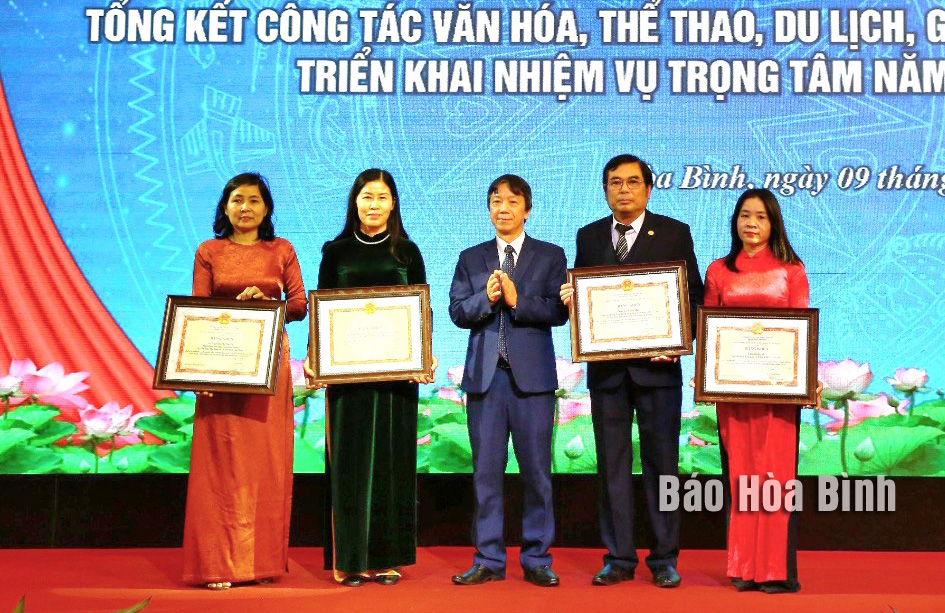
The provincial Department of Culture, Sports and Tourism on January 9 held a conference to review the culture, sports, tourism, and family work in 2023, and launch orientations and tasks in 2024.
Deputy Director of the provincial Department of Culture,
Sports and Tourism Luu Huy Linh presents certificates of merit of the Ministry
of Culture, Sports and Tourism to outstanding organisations and individuals at
the conference.
According to reports presented at the event, the province’s culture, sports and
tourism sector showed good performance in implementing its tasks in 2023.
The locality successfully organised the Khai Ha festivalof theMuong
ethnicgroup, and the folk-art festivalof ethnic minorities in Hoa
Binh. It also hosted the2023 National Traditional Musical Instrument
Soloand OrchestraCompetition, the terrain and short-distance
cycling tournament of the Vietnam Bicycle-Motor Sports Federation,
and the 37th national championship for mountain bike and road cycling in 2023.
Hoa Binh welcomed an estimated 3.8 million tourists in 2023, earning a total
revenue of 4 trillion VND (over 164 million USD), up 9.8% and 2.6% higher
than the plans set for the year, respectively.
The sector provided recommendations to the provincial People's Committee to
issue a plan to conserve and promote cultural values of the Muong ethnic group
in 2023 – 2030; and to the Steering Committee of the movementof "All
People unite to build cultural life”to issue plans and documents to
direct localities to implement the movement at the grassroots level.
Last year, the province’s culture household and residential area rates reached
88.3% and 96.3%, respectively. As many as 185 agencies and enterprises were
recognised to meet cultural standards in the 2018 - 2022 period. The percentage
of individuals regularly participating in sports and physical activities
reached 36.2%, while the ratio of households engaged in sports activities was
27%.
This year, the sector set to have 76.8% of households recognised
ascultural families, and 37.1% of the population regularly participating
in sports and physical activities.
Hoa Binh is expected to serve 4.2 million visitors and raked in 4.6 trillion
VND from tourism activities.
On the occasion, the Ministry of Culture, Sports and Tourism awarded
certificates of merit to two organisations and two individuals. Two others were
presented with insignias for the cause of culture, sports and tourism.
Meanwhile, three organisations and eight individuals were awarded certificates
of merit of the provincial People’s Committee; and 10 organisations and 11
individuals were honoured by the provincial Department of Culture, Sports and
Tourism.
Phong Phu commune, Tan Lac district of Hoa Binh province, is widely regarded as the cultural heartland of the Muong ethnic group. Among its many traditional communities, Luy Ai hamlet (formerly Ai hamlet) stands out as a rare location where the customs and way of life of the Muong Bi people remain largely intact.
The Truong Kha temple festival, a distinctive cultural event held every three years in Vu Ban township, Lac Son district, returned recently with vibrant rituals and folk traditions of the Muong people. Located next to the Buoi River in the Muong Trao fields, the Truong Kha Temple is dedicated to the three Kun Dol deities, revered for teaching farming techniques, irrigation, weaving, and protecting the harvest.
The demand for spaces serving community activities of residents in various areas across Hoa Binh city has been satisfied as local cultural houses now feature modern, spacious facilities thanks to the effective implementation of Resolution No. 49/NQ-HDND issued on December 28, 2021 by the city People's Council, which approved the plan for reorganising, converting, and allocating land for the construction, repair, and expansion of cultural houses in Hoa Binh’s villages and residential areas until 2025.
At the end of May, the Hoa Binh Provincial Ethnic Arts Troupe organized a series of performances for residents in Region 2 and Region 3 communes across the province. Bringing art to ethnic communities in remote, isolated, and especially disadvantaged areas has become a meaningful activity. These are not merely artistic performances but also journeys to disseminate cultural values, enrich spiritual life, and contribute to preserving the cultural identity of ethnic minorities.



